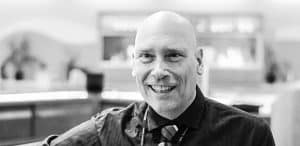I’m here today with Jill Jean, Director of Kitsap Regional Library. We’re talking as part of my series called “Local Heroes”, which features Northwest leaders who are champions of their organizations’ culture and agents for positive change. Links to my other Local Heroes interviews can be found at the end of this article.
Lauren: Tell me about Kitsap Regional Library.
Jill: We are a very interesting and geographically large county. We go all the way from the Manchester/Port Orchard libraries that are in our south county all the way up the peninsula to Poulsbo/Silverdale, and then dipping over to Bainbridge, then coming back up to Kingston and then Little Boston that is on the S’Klallam reservation. When I came from Seattle, I had lived on Bainbridge for about 15 years but I didn’t even know that there was a second tribe in our area. It’s right on the reservation and sits as a part of a longhouse complex of buildings, with an education center. Right across the street is one of the best things in the world which is a carving house, where the elders of the tribe actually carve according to their traditions. We are so blessed, not just in that library, but at our new Kingston library to have some examples of the art comes from that tribe.
So we have these just wonderfully strong libraries that really serve as the seats of the community. It’s very, very exciting. Our county is about 252,000 individuals. Probably one half of them are library card holders. We have 140 full-time equivalents but 200, roughly, employees. We have a lot of part-time people. Our volunteer core is probably close to between three and four hundred. Just on Bainbridge alone we have 200 volunteers of all shapes and sizes. And I think our county is unique because we do serve the military too.
How long have you been with Kitsap Regional Library?
I’ll be starting my 11th year in September.
You were with Seattle prior to that. I understand that you were in charge of the project to build the new central library.
Yes. It was a big chunk of five years of my life. I was there for 20 years all told. I came in to be the head of the children’s department.
How would you describe the culture in your organization and how has changed since you joined it?
I think it’s gotten a lot more professional. We care deeply about the individual and how they thrive. One of our values is that anyone can lead and we mean that. We try to support staff at all levels of the organization. Before I came, librarians and managers had a lot of attention. We try to pay attention to all of our staff, set solid goals for them, and provide them with development opportunities.
Even during the darkest days of 2009 and 2010 when our budget wasn’t great, we still supported a healthy conference and training agenda. I would never back away from that. I want people to grow every single year. I want goals set for individuals that are real and I want them to push them forward in some way. I’ve been known to send goals back and say, “Get me something better.”
But I just so believe that if we care about our staff, if we hire the best, and hire people who truly like people, even to the point of hiring happy people, we’re going to thrive as an organization. We have proven that as we have sought to change the culture of this organization.
You’re echoing the last interview I did with another CEO who talked about how important it is to hire people who are basically hardwired to want to help people and are happy about it.
What I also want are creative people who are willing to step outside of the box with confidence. One of the things we say here is that we want people to “step out of into the air,” as I call it, and maybe make some mistakes along the way. I don’t want them to repeat those mistakes, but I want them to exercise that creative spirit. We’ve become known in the library profession as a place where people can grow and learn and thrive and try new things. We basically try to stay out of their way. I sometimes think management can get in the way and it’s not helpful.
What is your leadership style like?
Oh, that’s easy! I’m very relational. It’s all about the relationships with my people. I care deeply about all of them. I think the downside of that is that I also take things very personally. I think I’ve learned particularly over the last 10 years to toughen up more and not do that—take things personally. That’s hard for me, because I care so deeply and my passion is sometimes too readily apparent.
What are some leadership lessons over the years? So what would the Jill of you now say to the Jill of even 10 years ago?
Don’t take things personally. I just care so deeply about people thriving in the environment that we create. I want everything to feed into that because it translates to how we provide service to our customers. If we’ve got great staff, they’re going to provide great service.
How Jill Works on Building Relationships with One-on-One Conversations
I was reading that you do an annual engagement survey and that in 2015 you did one-on-ones with every single person on your staff.
I met with 187 staff.
How long did that take you?
It took me one year. I was in a meeting one day with our librarians and I looked at one of them and thought, “I used to know this individual, I used to know what was going on with her family.” I like, more than the average CEO, to really know my staff. And I realized I had lost touch with her. And so I said, “Well I think I’m going to start meeting with our librarians and I’ll start with the adult services librarians because I know them a little less than I know the new services librarians.” And then I thought, “Well, I’ll meet with the services librarians too.” Then I thought, “Screw it. I’ll just meet everybody!” So I met with everyone except the people that I already came in contact with in regularly scheduled meetings.
Without a doubt, it was the best thing I’ve ever done. I allowed people to choose where we met, and pick the time of the day that we met to really control the conversation that they wanted. I found out so much about them as individuals and it made me feel so blessed to have the staff that we do.
Did it freak some people out?
It did. In fact, there was one person who was not able to meet with me and it was an individual that I see every single day but he said, “I can’t do it.” Because we already had this relationship, I was just stunned. But I said, “Don’t force it.” I think next time I do it, he’ll feel better and I would like him to feel like he can come to me, not that I’m making him do it. For some, it was like going to the principal’s office.
We all carry a lot of baggage from going to the principal’s office when we were kids or working with bosses who, the only time you met with them, was when you were in trouble.
The first people said, “Why am I first? Am I in trouble? It must be because I’ve done this or that.” Some people lost sleep the night before and other people wrote long dissertations. One of my managers told this story yesterday of one of our facility staff who said, “I finally got the trailer that I’ve been wanting for eight years just because I met with Jill.” Well, I never had heard that he needed a trailer but he did!
I also read that you heard so many needs that you had no idea existed. So many sounded like needs that were pretty doable in terms of fixes.
It could be done in a few minutes! One young woman who I already knew as a very good staff trainer told me she was interested in forwarding her career goals in the IT area. I said, “Then you absolutely need to begin to work in the IT department, because we’re going to have turnover there and I would love to see if you like the work.” Not only did she like the work, she thrived! And the whole staff welcomed her with open arms. And now she’s a full systems analyst for us. It was dramatic.
I watch people’s sick leave balances pretty carefully. This one person used her sick leave like water. I just feel so frustrated when staff do that because it’s not like a vacation balance. It’s not to be used in that way. I want people to have it saved up in case something catastrophic happens. But what I realized was this woman was a caregiver for her niece and nephew that live very close to her home. On a day that her sister was in trouble with child care, she could be the fill-in-the-blank person for these kids whom she cared about very deeply. I could get where that would become her priority. I still couldn’t totally support it, but I could understand it. So I said, “What if I have her do a temporary job at Bainbridge Island, which is very close to her home and see if that would help with some of this?” During that whole time, she never used any sick leave at all. It was dramatic to see those things. It didn’t really resolve the issue, but I’ve a better understanding and a healthy respect for what’s going on with her life.
I also believe in changing the atmosphere sometimes: going to the coffee shop, or going out to lunch or having a glass of wine after work; it changes the dynamic. And we do a lot of that “going for a walk” here. I’m also a believer in keeping that time sacred because I feel even if we’re just chatting about the weather or the family or some deep, dark problem that we’re having here at work together we’re, again, creating that relationship and taking the time for that relationship.
I like having the forum to address issues on a regular basis. I would rather have things out in the open and say, “You know, you hurt my feelings here.” Or, ‘I’m really sorry that it went this way for you.” Or, “How can we do it better next time together?” Or, “I’m giving you some feedback and I need to know how you’re feeling about that.”
I call it “getting ahead of the drama curve.”
I’m not always perfect because like anybody, I don’t love the drama. My teachers have been writing on my report cards since I was in second grade that I just want to see everybody get aligned. Sometimes I like to avoid the drama and so I may delay a particular talk but I find when I do, I pay a little bit for my transgression.
Books on leadership: besides The Leadership Challenge, what are your favorites?
I like the books by Goldman on emotional intelligence. I have Tom Peter and Peter Drucker on my shelf and, of course Steven Covey.
We have a saying here that “we hire only eagles; no ducks allowed.”
How do you hire people? What’s the process, what type of questions do you ask?
We have a saying here that “we hire only eagles; no ducks allowed.” That’s sort of silly but it’s become a kind of mantra with us that if we aren’t doing backflips over candidates, we do not hire them. We have a team approach that can be anywhere from two people to a cast of thousands. I think the most we’ve ever had in the room were six but that’s because we had six really interested individuals. I’m involved in a lot of the hiring. If I’m not directly involved, I want managers or director level people to justify their hires to me. I absolutely believe in hiring the best human resource person to make sure that we are following all procedures.
You want people that are going to bring roughly their same game every day. I think we’ve all worked with people that are mercurial and somedays they’re your pals and the next day, they aren’t or they bring a lot of their personal baggage.
We try to do the best references checking we can. We just do a thorough job of the process. We will bring people back two or three times. We will also use Skype interviews to see how good are they with technology.
It’s three to five years out from today, assuming you have no obstacles in your way, what does the library look like?
I’m very concerned about succession planning right now. Not my entire team, but a few key members of my team are going to be leaving. My CFO is going to leave next March, followed by my IT facility manager in June. I’m very cognizant of who is out there and how I can get people to take their place. I just hired a person to be our IT manager that I’ve wanted to hire for seven years and I’m so thrilled. He’s part of my succession planning. I’m always sort of seeking people out there on the horizon.
In three to five years, I would like our budget to be much healthier than it is. We do have a levy in November of 2017. We’ve had two unsuccessful levies, one just after I arrived. That was a hard loss. Circumstances are always happening in this county that are outside of our control and I think we’ve been affected dramatically both times. I’m hoping in 2017 we won’t have those circumstances. We are going to be working with a national non-profit organization that helps libraries pass levies. We are also working with some local people who will be our boots on the ground. So we’re doing it very differently and we’re pulling out all the stops to bring in the professionals to help. And we’re starting several years ahead.
I would like our budget to be healthy and sustainable for a good chunk of time because the voters are fatigued. They don’t pass tax laws or tax levy lifts easily here in this county so I’d like this money to last for a good long time. I would like it to support our buildings. We don’t have a healthy capital budget and more of our building owners are saying, “I can’t do it anymore so library, it’s all yours.” I think there are now three cities that are owners. If I said, ‘I’ll take the library from you tomorrow,” they would hand me the keys. I’m seeing that the future will be us owning more of our buildings. Although I think our budget situation being somewhat restrained has helped us be very good stewards of our dollars and careful managers. We are very careful about how we approach projects and what the ramifications are of those projects. We don’t put anything in on a temporary basis that we can’t support long-term.
I also would like healthy leadership here which means leaders that are emotionally intelligent and can hire good people, not the first body that comes along. And I would hope for stability for my governing board which is a group of five individuals. I would hope that they would understand their role as a board and not dip down into library operations, which can happen with volunteer boards. I want a thriving foundation, with a strong donor base and an endowment to get us through the rougher times. I would like a new Silverdale library to have opened and we would be on to our third capital campaign. I’d like all the outliers still on our staff gone. And I would like our school relationships to be thriving even more. We’re looking at a co-located facility with south Kitsap and I would hope we would have one solid relationship established and then it could be a prototype for other school districts. So that’s where I am.
You’re saying “Dear Santa, I want it all!” That’s a good thing!
I do. And I think we’re at the cusp of getting a lot of this so it’s feeling really good. Our foundation just did a strategic planning session. We finished it last night and I’m just so happy where they’re at. When our executive director came in, we were probably an organization that might have had maybe $500,000 in the bank on a good day and now we’ve gone over a million and have raised money for Kingston. That’s all out the door and done. And now we’re on to Silverdale!
Want to know the 7 Habits of all the Local Hero Leaders I’ve interviewed? Click here.




